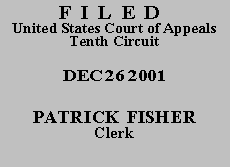
| UNITED STATES OF AMERICA,
Plaintiff-Appellee, v. FRANK JAMES FEUGATE, Defendant-Appellant. |
|
In November 2000, the defendant pleaded guilty to possession of a stolen firearm in violation of 18 U.S.C. § 922(j). Defendant acquired the firearm during a burglary committed prior to the present offense.(1)
According to the record, the defendant's base offense level was calculated under USSG § 2K2.1(a)(2), which provides for an offense level of 24 if a defendant has at least two prior felony convictions for crimes of violence. His offense level was increased by two points under § 2K2.1(b)(4) because the firearm was stolen, and decreased by three points under § 3E1.1 for acceptance of responsibility. He had a total offense level of twenty-three and a criminal history category of VI. The district court sentenced him to 112 months, with the sentence to run concurrently with the remaining portion of his state sentence, followed by three years of supervised release.
On appeal, he asserts the district court erred in increasing his offense level under § 2K2.1(b)(4). He argues that application of this enhancement amounts to impermissible double counting because his offense level already took into account the fact that the firearm was stolen.
We review the district court's application of the sentencing guidelines de novo, and uphold the court's factual findings unless clearly erroneous. See United States v. Valdez-Arieta, 127 F.3d 1267, 1270 (10th Cir. 1997). We have jurisdiction under 28 U.S.C. § 1291.
Application Note 12 to § 2K2.1 sets forth the criteria establishing when the § 2K2.1(b)(4) enhancement does not apply. This note, which was amended in 1995, now reads:
If the only offense to which § 2K2.1 applies is 18 U.S.C. § 922(i), (j), or (u), or 18 U.S.C. § 924(l) or (m) (offenses involving a stolen firearm or stolen ammunition) and the base offense level is determined under subsection (a)(7), do not apply the adjustment in subsection (b)(4) unless the offense involved a firearm with an altered or obliterated serial number. This is because the base offense level takes into account that the firearm or ammunition was stolen.
USSG § 2K2.1, comment. (n.12). Contrary to the defendant's assertions, Note 12 as amended clearly does not preclude application of the § 2K2.1(b)(4) enhancement in this case. Although convicted under § 922(j), the defendant's base offense level was determined under § 2K2.1(a)(2), not § 2K2.1(a)(7).(2)
The defendant further argues that this court's decision in United States v. Rowlett, 23 F.3d 300 (10th Cir. 1994), rules out application of the § 2K2.1(b)(4) enhancement. This argument lacks merit. The court notes that Rowlett was decided before the 1995 amendment to Application Note 12. Further, "Rowlett stands only for the proposition that the gun involved must have been stolen prior to and not as part of the offense for which the defendant is being held responsible." United States v. Herrman, No. 96-3076, 1996 WL 621028, at **1 (10th Cir. Oct. 28, 1996) (unpublished).(3) In this case, the offense of possession of a stolen firearm was committed after the firearm was stolen by the defendant.
The court concludes that application of the § 2K2.1(b)(4) enhancement by the district court was proper and did not constitute impermissible double counting.
Accordingly, the district court's sentence is AFFIRMED.
Entered for the Court
Chief Judge
*. This order and judgment is not binding precedent, except under the doctrines of law of the case, res judicata, and collateral estoppel. The court generally disfavors the citation of orders and judgments; nevertheless, an order and judgment may be cited under the terms and conditions of 10th Cir. R. 36.3.
1. In 1999, Mr. Feugate pleaded guilty in Kansas state court to burglary of a dwelling. He was sentenced to an eighteen-month term followed by twenty-four months of post-release supervision.
2. The pre-1995 version of Application Note 12 stated: "If the defendant is convicted under 18 U.S.C. § 922[i], (j), or (k), or 26 U.S.C. § 5861(g) or (h) (offenses involving stolen firearms or ammunition), and is convicted of no other offense subject to this guideline, do not apply the adjustment in subsection (b)(4) because the base level itself takes such conduct into account." USSG § 2K2.1, comment. (n.12).
3. Pursuant to 10th Cir. R. 36.3(B)(1), the court cites this unpublished opinion for persuasive authority only.